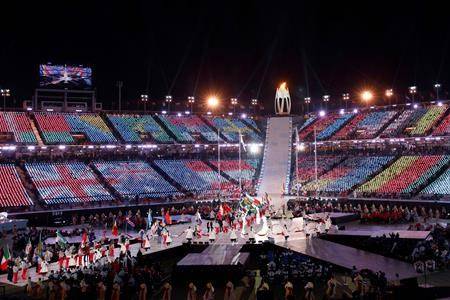On the night Canada’s curlers lost a last-rock heartbreaker in the Paralympic semifinals, hockey player Billy Bridges was waiting up for them when they returned home to the athletes village.
“Billy gave me a pat on the back and said ‘You’ve got to go tomorrow and win that medal for us,’ meaning the whole team Canada,” said skip Mark Ideson, who led Canada to bronze. “And that really put things back in perspective for me. So (Saturday) we played for Canada.”
The Canadian team of 55 athletes strong had set a cautious goal of 17 medals at the Pyeongchang Paralympics, one better than four years ago in Sochi.
🔥 👋
The Paralympic flame is out, but the passion of #PyeongChang2018 remains in our ❤️#Paralympics pic.twitter.com/oOELvmHRdG
— Paralympic Games (@Paralympics) March 18, 2018
But the Canadians blew past that mark with several days still to go and never looked back, capturing 28 medals to crush their previous best of 19 in 2010 in Vancouver.
The athletes credited Canada’s performance to a strong sense of teamwork, and a solid group of young stars on the rise.
“There were no down days, I think we were riding the high,” said Mark Arendz, whose six medals in biathlon and cross-country skiing earned him the role as the team’s flagbearer in Sunday’s closing ceremonies. ”We started on this wave and we were riding it, not just nordic, but everyone here in team Canada contributed to that as well.”
The 28 medals were second best behind the United States (36). Ranking by gold medals, Canada, with eight golds, was third behind the Americans (13), and the Neutral Paralympic Athletes from Russia, who had eight gold but more silver than Canada.
Canada’s nordic team — biathlon and cross-country — led the way with 16 medals.
“Nothing unexpected for us, but it took absolutely everything, and that’s what you want at a Paralympic Games, to hit that peak and get as much out of our team as we can,” said Brian McKeever, who raced to three gold, plus a bronze Sunday in the relay. ”We did it, and it was great teamwork. That’s been our theme is teamwork.”
The Paralympic team’s performance comes a month after Canada recorded a best-ever winter Olympics with 29 medals.
“That gets us off on the right foot,” said Arendz. ”I personally love watching the Olympics. That gets the spirit going, and then the closing of the Olympics, and then you’re like ‘Oh wow, now it’s our turn.’”
The Olympic team handed off the baton, and the Paralympic team took it and ran.
“Following the Olympic Games, you always have that pressure in terms of how our Olympic counterparts did,” said Canada’s chef de mission Todd Nicholson. ”They paved the way for us, in order to create that atmosphere to be successful here.”
Nicholson, wearing a chef’s hat and apron — a tongue-in-cheek nod to his role as team “chef” and leader — said the Paralympians arrived in Pyeongchang ready to go.
“They came here came prepared, mentally and physically, and in the best shape that they possibly could be in, to leave it all on the field of play. Everybody peaked at the right time,” he said.
McKeever, who became the country’s most decorated winter Paralympian in Pyeongchang, also credited the changing culture in Canada, and the support Paralympic athletes receive from Sport Canada, Own The Podium, and their various corporate sponsors.
“When I started in 2002, there was very little funding, we were picking up the scraps of what was left over from the able-bodied programs,” said the 38-year-old. ”I remember doing World Cup trips with one coach and also I was helping with wax testing and waxing and we were doing it all as one group.”
McKeever, whose remarkable career spans five Paralympics, hopes Canada’s performance has touched people — and most importantly young people with disabilities — back home.
“We can reach out to more people, we can get more support, we can hopefully reach out to more young people with disabilities to get them into sport,” he said. “Sport is great for the spirit, it’s great to just be kids and playing outside, and hopefully now they’ll start to know there’s a vehicle for that if they want to continue in sport, they can go all the way to the top levels.”
While McKeever and Arendz led the parade to the medal podium, numerous young athletes were all too eager to follow them there, showing Canada’s future in Paralympic indeed looks bright. Among them: Natalie Wilkie, a 17-year-old cross-country skier who won gold, silver and bronze in her Paralympic debut; downhill skier Mollie Jepsen, who raced to four medals including one gold; and Liam Hickey and Corbyn Smith, a pair of 19-year-olds on Canada’s Para ice hockey team.
Canada dropped a 2-1 hockey heartbreaker in overtime Sunday to wrap up the Paralympics, and the veterans couldn’t say enough about the team’s youngest players.
“The talent that this game has, looking at my younger teammates and what they can do, it’s so inspiring, it makes you want to keep going and see where the sport can go,” Bridges said. ”The best showcase for this game and this sport is the youth that are coming up, and what they do with the puck and how fast they are … what they can accomplish is just incredible.”
Added captain Greg Westlake: “It feels bad today but there’s gold medals in that room (in the future) even if they don’t know it.”
Pyeongchang set numerous records, including ticket sales for a winter Games. Organizers said the 345,000 tickets sold was 157 per cent of their target of 220,000.
A record 48 countries and 567 athletes — the previous bests were 45 countries and 547 athletes — competed in 80 events, eight more than Sochi.
Lori Ewing, The Canadian Press



